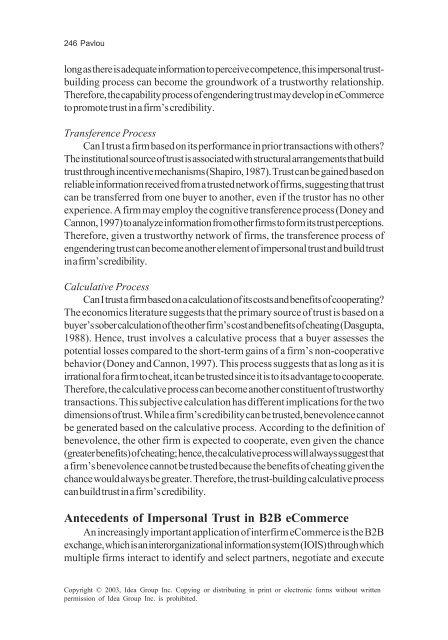www.sharexxx.net - free books & magazines
www.sharexxx.net - free books & magazines
www.sharexxx.net - free books & magazines
Create successful ePaper yourself
Turn your PDF publications into a flip-book with our unique Google optimized e-Paper software.
246 Pavlou<br />
long as there is adequate information to perceive competence, this impersonal trustbuilding<br />
process can become the groundwork of a trustworthy relationship.<br />
Therefore, the capability process of engendering trust may develop in eCommerce<br />
to promote trust in a firm’s credibility.<br />
Transference Process<br />
Can I trust a firm based on its performance in prior transactions with others?<br />
The institutional source of trust is associated with structural arrangements that build<br />
trust through incentive mechanisms (Shapiro, 1987). Trust can be gained based on<br />
reliable information received from a trusted <strong>net</strong>work of firms, suggesting that trust<br />
can be transferred from one buyer to another, even if the trustor has no other<br />
experience. A firm may employ the cognitive transference process (Doney and<br />
Cannon, 1997) to analyze information from other firms to form its trust perceptions.<br />
Therefore, given a trustworthy <strong>net</strong>work of firms, the transference process of<br />
engendering trust can become another element of impersonal trust and build trust<br />
in a firm’s credibility.<br />
Calculative Process<br />
Can I trust a firm based on a calculation of its costs and benefits of cooperating?<br />
The economics literature suggests that the primary source of trust is based on a<br />
buyer’s sober calculation of the other firm’s cost and benefits of cheating (Dasgupta,<br />
1988). Hence, trust involves a calculative process that a buyer assesses the<br />
potential losses compared to the short-term gains of a firm’s non-cooperative<br />
behavior (Doney and Cannon, 1997). This process suggests that as long as it is<br />
irrational for a firm to cheat, it can be trusted since it is to its advantage to cooperate.<br />
Therefore, the calculative process can become another constituent of trustworthy<br />
transactions. This subjective calculation has different implications for the two<br />
dimensions of trust. While a firm’s credibility can be trusted, benevolence cannot<br />
be generated based on the calculative process. According to the definition of<br />
benevolence, the other firm is expected to cooperate, even given the chance<br />
(greater benefits) of cheating; hence, the calculative process will always suggest that<br />
a firm’s benevolence cannot be trusted because the benefits of cheating given the<br />
chance would always be greater. Therefore, the trust-building calculative process<br />
can build trust in a firm’s credibility.<br />
Antecedents of Impersonal Trust in B2B eCommerce<br />
An increasingly important application of interfirm eCommerce is the B2B<br />
exchange, which is an interorganizational information system (IOIS) through which<br />
multiple firms interact to identify and select partners, negotiate and execute<br />
Copyright © 2003, Idea Group Inc. Copying or distributing in print or electronic forms without written<br />
permission of Idea Group Inc. is prohibited.









